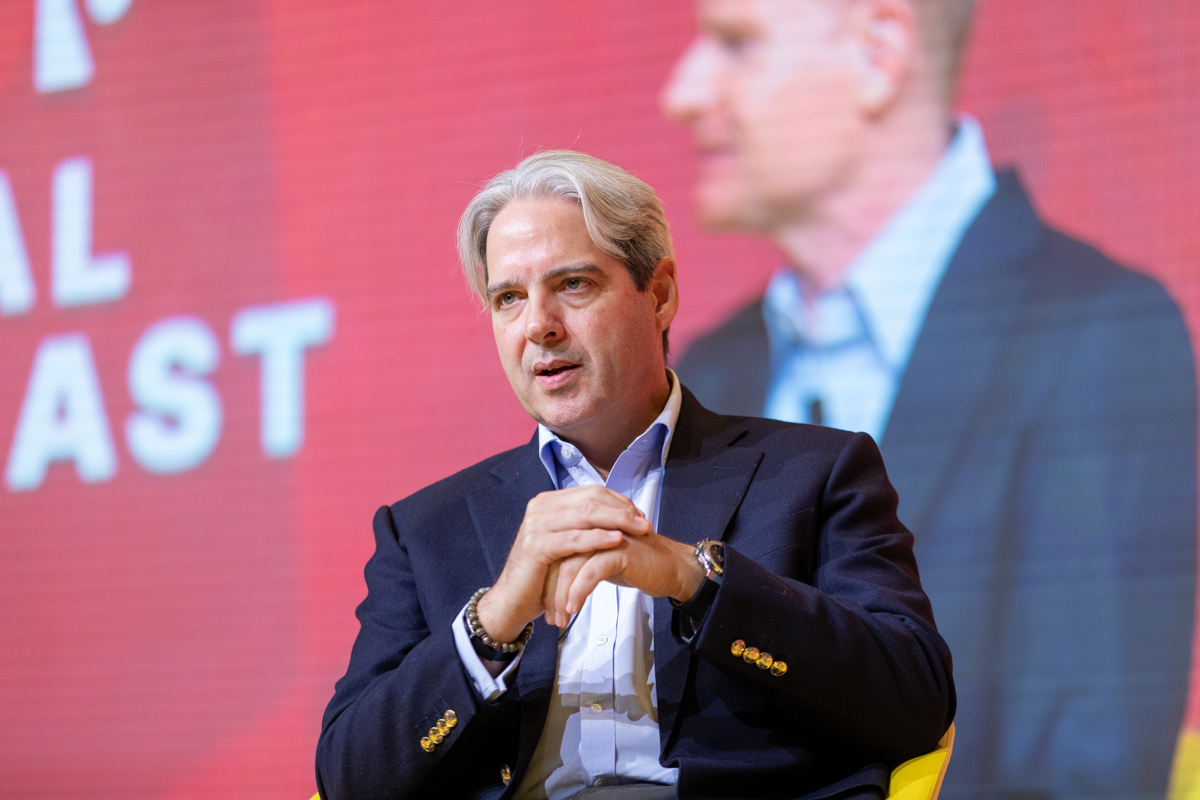Hilton to Add 35,000 Jobs in Middle East Push, Regional Head Says

Skift Take
Hilton’s jobs push comes as the hotel giant sees surging demand in the region, with visits to its Middle East properties doubling to 2.2 million in the first nine months of the year compared to pandemic levels.
Hilton plans to create about 35,000 new jobs across the Middle East as the travel giant launches an ambitious regional expansion that will double its portfolio with 130 new hotels and resorts.
The company’s regional president, Guy Hutchinson, said Hilton properties in the Middle East doubled guest numbers in the first nine months of the year to about 2.2 million compared to pre-pandemic. To keep up with demand, the portfolio is “at least” doubling in size with 130 new hotels, and the operator expects to generate around 35,000 new jobs in the coming years.
“It is a golden age of hospitality for the region,” Hutchinson said at Skift Global Forum East 2024 in Dubai on Wednesday. “We’re seeing this part of the world emerge as a thought and product leader. Across the region, you have these national tourism strategies underpinned by amazing infrastructure. That’s supercharging growth.”
For the first nine months of the year, the Middle East and Africa saw the highest average daily rates and revenue per available room across Hilton’s global network at $176 and $125, respectively.
Like most hotel operators in the Gulf, Hilton has benefitted from a range of public-sector partnerships. In October, Hilton and Dubai Tourism signed an agreement to work together to improve service standards and talents across hotels.
“The people pipeline is as important, if not more, than the property pipeline,” Hutchinson said of the company’s labor development efforts.
In November 2022, the operator signed a deal with Saudi’s immense Tourism Development Fund to fuel growth, and a year later, another deal with Saudi Tourism Authority to boost collaboration.
Hutchinson said on stage these government partnerships are key to growing in the region.
“That collaborative strength between public and private is what sets the region apart. And Dubai is the gold standard. It’s a world-class way of developing industry. We’re seeing that across the region though, into Abu Dhabi, into Qatar, into Saudi Arabia. In Saudi, this is fueling growth. One in four branded hotel rooms in KSA is one of our flags.”
Hutchinson added that these new hotels will generate tens of thousands of jobs in the region. “I don’t think it’s talked about enough. The people pipeline is as important, if not more, than the property pipeline. Our [new] properties will generate 30-35,000 jobs at a minimum.”
A Subtle Midmarket Push
With Hilton needing to follow the government to fuel its growth, the operator has to follow how these destinations want to develop. For many years, the request has been overwhelmingly to develop luxury, but mid-market is starting to make its way in.
“25% of our portfolio in the region now is mid-market. One of the best-kept secrets is just how well-diversified the Dubai market is. The reality is only 25% of [all] keys in Dubai are luxury.
“[But] we’ll probably double our portfolio of luxury and lifestyle in the region. Probably the biggest center of luxury and lifestyle for Hilton is in the Middle East. We’re probably the biggest driver of luxury and lifestyle globally for Hilton [here in the Middle East].”
Last month, global Hilton CEO Chris Nassetta posited that the future of the industry is in catering to the middle class. He said in Riyadh: “My own view is we’re at the beginning of a golden age of travel. “Three things are driving that. One is demographics: We’re going to have over five billion in the middle class by 2030. Middle-class growth is huge.”
Aiming To Be The Best
Looking to the future, Hutchinson spoke less about Hilton specifically and more about how Middle East hospitality has a duty to leverage government-supported opportunities.
The overall goal? To be the best.
“We have a core responsibility to the government. It’s not just about building assets; it’s about building a world-class industry and infrastructure. And it’s not just about the physical standard; it’s about the holistic experience that will set a world-class hospitality benchmark around the experience people have.”
“It sounds cliche, but it’s all about opportunity. This region is uniquely focused on growing this industry and we need to capture that. The pace of change [here] is unlike anywhere else.”
Accommodations Sector Stock Index Performance Year-to-Date
What am I looking at? The performance of hotels and short-term rental sector stocks within the ST200. The index includes companies publicly traded across global markets, including international and regional hotel brands, hotel REITs, hotel management companies, alternative accommodations, and timeshares.
The Skift Travel 200 (ST200) combines the financial performance of nearly 200 travel companies worth more than a trillion dollars into a single number. See more hotels and short-term rental financial sector performance.
Related
A top recruiter says sports marketing roles are hot right…
Jobs are opening up in the sports industry as teams expand and money flows into the industry.Excel Search &
Public employees and the private job market: Where will fired…
Fired federal workers are looking at what their futures hold. One question that's come up: Can they find similar salaries and benefits in the private sector?
Mortgage and refinance rates today, March 8, 2025: Rates fall…
After two days of increases, mortgage rates are back down again today. According to Zillow, the average 30-year fixed rate has decreased by four basis points t
U.S. economy adds jobs as federal layoffs and rising unemployment…
Julia Coronado: I think it's too early to say that the U.S. is heading to a recession. Certainly, we have seen the U.S. just continue t










